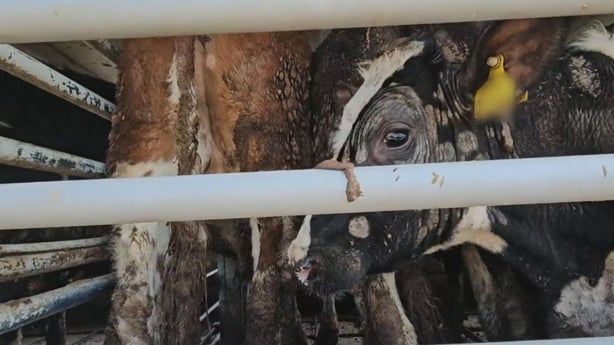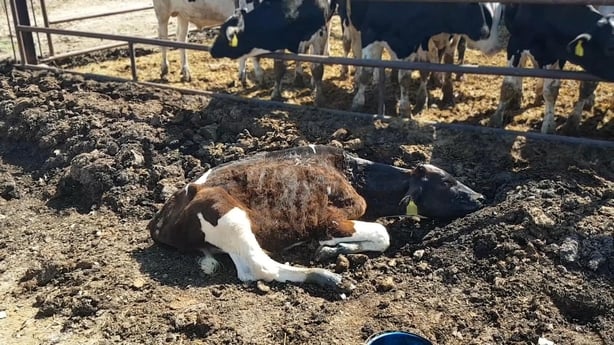The President of the Irish Creamery and Milk Suppliers Association (ICMSA) has said the European Commission may need to "step in" after being shown footage of the condition hundreds Irish calves were left in after being exported across Romania and onwards to Israel.
RTÉ Investigates traced their journey and witnessed the Irish calves exiting transport vehicles in Haifa Port in northern Israel.
"Some of those animals are clearly not fit for transport. They should not be put on a boat, put on a lorry, put anywhere," said Denis Drennan, President of the ICMSA.
Hundreds of Irish calves, many covered in dung, were filmed as they were brought off ships in soaring heat in the port.
They can be seen showing signs of heat exhaustion and ringworm, legs can been seen sticking out from the transport trucks.
Watch: A clip from 'Live Exports: On the Hoof'
They had been transported to Romania months earlier from Ireland, a five-day journey. Then after being housed in sheds in Romania they were taken on an 800km road journey to a port before being transported by ship to Israel, another five-day boat journey.
EU regulations set out strictly how live animals being transported must be rested and fed during their journeys.
Mr Drennan said the animals appeared in the poor condition they are because "rules and conditions are not being adhered to and enforced."
"The Romanian officials - whoever is deemed to be responsible for the animal welfare issues in Romania - needs to clamp down on this, if those animals are being treated this way. And if the Romanian officials are not willing to do it, the EU Commission needs to step in," he said.
Read more: Left to rot: Secret cameras reveal calves beaten before export
RTÉ has continued to investigate the treatment of Irish calves in the wake of Europe-wide interest in a major report published and broadcast in July, 'RTÉ Investigates: Milking It, Dairy's Dirty Secret.’
It exposed how EU regulations on the transport of live animals were being broken as Irish bull calves were transported by truck to mainland Europe. The programme also raised major questions about the treatment of animals at marts in Ireland.
In recent months, the number of Irish bull calves being exported to Romania has increased, while the rate of exports to The Netherlands - traditionally Ireland’s biggest export destination for calves - has fallen.
78,000 calves were exported to The Netherlands so far in 2024, down from 106,000 last year.
It follows growing criticism in Ireland and mainland Europe to putting live cattle exports through the long sea journey from Ireland to France - which contravenes EU regulations on feeding intervals for young calves.
There are also Dutch concerns about the presence of the BVD virus in Irish cattle, which weakens their immune system.
Such concerns are not as prevalent in Romania, which sends 80% of its cattle exports to Israel.

Israel has had an increased demand for cattle imports from Romania since several countries ceased transporting live exports to it after the outbreak of the war in Gaza.
Exporting to Israel is controversial for several reasons, but RTÉ has found that the number of Irish bull calves ending up in Israel has been growing, despite that not being reflected in official figures.
Research by RTÉ Investigates found that thousands of calves originating from Ireland are listed as Romanian in official Israeli import figures.
A single farm
Documents uncovered also show 97% of the Irish bull calves exported from Ireland to Romania are brought to a single industrial-scale farm in the tiny village of Grabat.
The farm is owned by the DeLevie group, a major Israeli livestock trading company with operations in the Netherlands, which has been expanding its operations in Romania.
From the DeLevie farm in Grabat, the Irish calves are transported by road for around eleven hours to the Black Sea Port of Midia, where the transport trucks board ships for a five-day journey by sea to Israel.
They are being shipped to Israel to be finished and slaughtered. In line with kosher methods of killing, the cattle will be fully conscious until the moment of death.
The DeLevie Company did not respond to a request for comment about its practices.

A leading Irish vet and specialist in animal welfare was also shown the footage of the calves being off-loaded in Haifa. Dr Simon Doherty said the animals are showed signs of "shipping fever",
Watching the footage he said, "you would expect with a normal grip of animals that there'd be one or two of them would be mooing... you’ve just got complete silence here."
"These animals are almost at a point where they're just knackered... there’s a lot of dung caked in around them, a bit of ringworm around their eyes. These are animals who are really starting to look a lot more under stress now."
The research builds on practices exposed in by RTÉ Investigates in July, which raised questions about how the scale of cattle breeding Ireland had resulted in bull calves having almost no value, as they do not produce milk.
Among other things, it prompted calls for increased use of sexed-semen in Irish cattle breeding, as used elsewhere, to artificially reduce the number of bull calves born each year.
RTÉ Investigates, Live Exports: On the Hoof will be broadcast on Prime Time on RTÉ One Television on Thursday at 9.35pm



